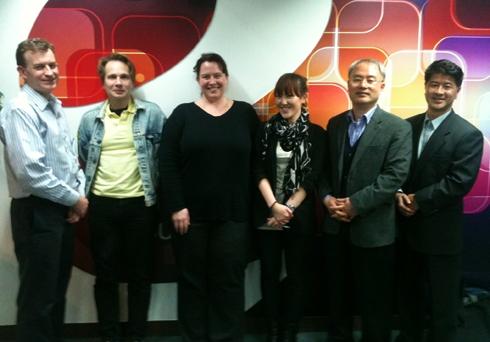[112회 4월 11일 방송] 일본의 독도영유 발표, 우리의 대처는?
- 가

대지진, 츠나미, 원전폭발사태 등 3재를 당한 일본에 대해 한국 국민이 이례적으로 모금운동을 벌이는 등 양국 사이의 정서가 화기애애해졌다. 하지만 일본 정부의 갑작스런 독도영유 및 일본 정신대 교과서 정책 발표로 양국 관계가 다시 급랭했다. 대재앙 이후의 일본이 민족주의와 우경화되면서 동북아시아에 새로운 긴장이 형성될지, 한국의 대처는 어떠해야 하는지 에 대해 토론한다.
#guests
①고종환 부경대 국제지역학부 교수
②알렉산드리아 동서대 국제관계학 교수
③로버트 켈리 부산대 정외과 교수
④조 필립스 부산대 국제관계학과 교수
1.INTRO
Have you ever heard of ‘The Sisyphean task’ from Greek mythology?
As a punishment from the gods, Sisyphus was made to roll a huge boulder up a steep hill, but before he could reach the top of the hill, the rock would always roll back down, forcing him to begin all over again. Zeus bound Sisyphus to an eternity of frustration with the boulder rolling away from Sisyphus when he neared the top of the hill. It’s an endless, unavailing task.
The Korean-Japanese relationship is analogous to the Sisyphean task: Each time we seem to reach our amicable relationship, we encounter an obstacle that sets the relationship back.
In the past, it was the colonial rule, the comfort women of World War II, the Yasukuni shrine visit. This time it is Dokdo.
The territorial dispute is a major source of nationalist tensions for both countries. Tonight on Let’s Talk Busan, we will talk about the politics, economics, and national emotions that underlie this remote, inhospitable island.
For now, we have our first song ‘HEY, SOUL SISTER’ by ‘TRAIN’
2.Bridge
The outpouring of goodwill from Korea in the aftermath of the unprecedented tsunami was supposed to usher in a new era for Korea and Japan’s bilateral relationship.
The new hope, however, was quickly dashed by the Japanese government’s recent approval of the middle school textbooks which describe the Dokdo islets as Japanese territory under Korea’s illegal occupation. With this move, the relationship has shifted into reverse gear.
New Japanese textbooks claiming Japan’s sovereignty over Dokdo disappointed many in Korea following a rare outpouring of sympathy for their former colonial ruler, hit hard by a devastating earthquake and tsunami.
What is alarming, however, is to see Japan pursuing its choreographed plan in the middle of the once-in-a-century national emergency and in full awareness of how Korea would respond to such a plan, particularly at this juncture.
In a sense, Japan made it clear that it would not budge an inch as far as this issue is concerned -- whether doing so is practical or not. The Dokdo issue will almost function as a reset button that, with a single push, can erase any sort of amicable progress that has taken place.
Now, we have our reporter Hyojung in the studio to give us a more detailed background on this issue.
3. Hyojung Reportage
석준: Hello, Hyojung.
Hyojung: Hello, 석준
석준: Hyojung, you mentioned that you lived in Tokyo for a while. How did you feel when you first heard the news?
Hyojung: For me, this is a very touchy and sensitive issue. Having lived in Tokyo for a while, I thought I had a fairly good understanding of Japanese society or their cultural aspect but this is quite unexpected and I must say I’m a little disappointed at how they’re handling the issue or even Korean government’s reaction.
석준: Yes, I felt like they went overboard as well. This issue has a history. But this time around, it had completely different dynamics than the last, right? What made it so different?
Hyojung: This increasingly vocal attitude from Japan over Dokdo has been around for long, if you’re a Korean national, you should be able to chant the song called ‘Dokdo is our land’. But recent dispute is rather unique if you take unprecedentedly phenomenal amount of donation and aid from Korea into account to help out post-earthquake and tsunami region.
석준: Right, the problem is timing.
Hyojung: Exactly. It’s a whack in the head. Japanese government’s approval over distorted textbooks for middle school students is pouring cold water on bilateral diplomatic relation we’ve built up between Korea and Japan. Korea’s never shown this much sympathy especially towards our former colonial ruler Japan.
석준: I must say I was shocked as well. What did they say about Dokdo in that controversial textbook?
Hyojung: Last Wednesday, the Japanese Textbook Authorization announced its view of the middle school textbooks that will be used from next year. All the geography and social studies textbooks made claims to Dokdo, or so-called Takeshima, as part of Japan. In the previous inspection five years ago, rightist Husosha Publishers was the only one that claimed, “Takeshima is occupied illegally by Korea.” However, this time, major publishers joined in, including Tokyo Shoseki, whose textbooks were used in 61 percent of middle schools in 2005.
석준: Whoa, 61 percent? That’s a huge difference from 5years ago. That means more than half of current Japanese students will grow up thinking Dokdo is part of their land.
Hyojung: That’s right. The land of their own illegally occupied by neighboring Korea.
석준: Did the issue start from the LIberal Democratic Party, who are more conservative compared to the ruling DPJ(Democratic Party of Japan)?
Hyojung: It might have started with rather rightist party but as far as Dokdo is concerned, there is no distinction between the ruling and opposition parties in Japan. If lawmakers from DPJ(Democratic Party of Japan) raise territorial claims to Dokdo and if Korea counters them, LDP(Liberal Democratic Party) will say they share the position.
석준: Well, general opinion from the public is that this phenomenon is related to deeply-rooted bureaucracy and nationalistic attitude from Liberal Democratic Party-led politics?
Hyojung: Among frustration and anger, that seems to be the consensus for now. People have been asking for the reason why Japan could have chosen this timing out of all.
석준: Exactly.
Hyojung: Basically, what the public think is that this situation stemmed from Japan’s intrinsic lack of flexible attitude and their ossified bureaucratic mechanism, not to mention rudder-less politics without a strong leader figure.
석준: I see. After Japanese government approved distorted textbooks for middle school students, has there been any announcement from Korean government?
Hyojung: In fact, President Lee Myung-bak made remarks about Dokdo at conference held about a week ago. He said Dokdo is Korean territory ‘even if the whole world was to be turned upside down not once but twice’ to quote him.
석준: That’s a rather aggressive approach compared to previous announcements.
Hyojung: It is if you think about the approach Korean government has been taking. Seoul has largely adopted a quiet diplomacy of ignoring Japan’s challenge so far but the tactic has the danger of appearing to acknowledge Japanese claims.
석준: Any progress after the conference?
Hyojung: Japan takes an approach towards the Dokdo issue with a 'strategic nationalism' mobilizing all logic and education. So in fact, Seoul held an emergency meeting to discuss how to tackle Japan’s claims and drew up measures earlier today.
석준: Can you tell us more about it?
Hyojung: While cautious not to provoke too much tension as Japan continues to suffer from the aftermath of a catastrophic quake, South Korea is quietly carrying out projects to build breakwater and also rebuild a heliport in Dokdo while considering deploying military troops to strengthen our sovereignty.
석준: Thank you for your reportage, Hyojung.
Hyojung: Anytime, 석준
|
4 Talk of the Town
석준: Okay, that was our reporter Hyojung in the studio.
Japan’s relations with its immediate neighbors have taken a drastic dip in recent times over territorial disputes. But the Japanese government made an official statement that it had approved junior high school textbooks describing the Dokdo islets as part of Japanese territory. Japanese officials were quoted as saying that Japan went ahead with the announcement because it had already been scheduled.
Tonight, we’re going to talk about its claims, legitimacy, similar disputes abroad and repercussions it will have on bilateral relations between Korea and Japan.
We have four professors in our studio; Professor Ko Jong-whan, Aleksandra Thurman, Joe Phillips and Robert Kelly.
Can you briefly introduce yourselves please?
Guests: …
석준: Thank you all for being here tonight. We’ll begin with our first question.
Q1. What is Dokdo? [Prof. Ko]
- Being brought up in Korea, what kind of meaning does Dokdo carry to Koreans?
- Also having lived in Japan, did you feel as if the public pay any attention to Dokdo, so-called Takeshima or even aware of it?
Q2. Why is it important to Koreans and/or Japanese? [Prof. Ko]
- From a maritime point of view [Aleksandra]
- From security point of view [Robert and Joe]
- Other reasons it may be important (economic, nationalistic)?
Q3. How are international maritime disputes resolved?
- What is the peaceful process?(int’l courts? Do they have enforceable power?) [Aleksandra]
- What are well-known territorial disputes that have led to war? [Aleksandra]
- [e.g., Falklands or other historical disputes that led to war. [Robert and Joe]
Q4. On March 29, the Japanese government announced the endorsement of textbooks that characterizes Dokdo as an island of Japan. Timing, certainly, did not seem right. Why do you think Japanese government announced the issue at this inopportune timing? [All Professors]
- Were they just following the already established steps/ manual as they’re told/ expected?
(Japan is known to be a country of manuals, where virtually everything is planned ahead and executed according to that plan)
- (the way they dealt with earthquake victims, shelters and aids)
- no room for second thought or flexibility under any circumstances(ossified)
=epitome of bureaucracy
- trying to take advantage of post-earthquake period and overcome by stirring up nationalism among the people. (Dokdo=political tool)
- Obviously, at this time of crisis, they need international help but by surfacing the issue, they’re voluntarily turning down the help in advance.
석준: Yes. I believe our audience will much appreciate varied opinions from our guests. For now, we’re going to take a short break and then come back to delve into Japan’s attitude revolving this controversial claim. Our next song is ‘DANCING IN THE MOONLIGHT’ by TOPLOADER.
5 Song2: Dancing In the Moonlight by Toploader
석준: That was ‘DANCING IN THE MOONLIGHT’ by TOPLOADER. We’ve heard our panelists’ opinions from international and political perspectives with precedents. Now, I’d like to focus on Korea-Japan’s relationship and how it will develop from now on and also Japan’s general attitude towards their claims.
Q5. The nation was more prepared than Japanese government.
- The world was taken aback by the calmness and the way Japanese people dealt with the catastrophic earthquake.
- Again, surprised by how poorly the government dealt with it too and how they could claim the rights of sovereignty at this time of crisis.
= not the way globalized country would normally act
Q6. Japanese society/government will try to make this another episode they overcame, coupled with Hiroshima, Nagasaki’s bombing in 1945 and the war. It’s possible chauvinistic nationalism will prevail.
- Japan’s politics have become rudder-less for a long time. But somehow, especially after the quake, it looks like they’ve finally decided on which path to take even though the direction’s posing a danger. Undoubtedly, they will try to use this incident to strengthen their nationalistic ideals and that will only result in rather unilateral relationship between Korea and Japan and perhaps aggravate the ties we already have. [Prof. Ko]
Q7. After the earthquake and tsunami, Korea has raised unprecedentedly large sum of donation for those who have been affected. Korea has never been this sympathetic towards Japan in history. Could humanitarian aids work as a catalyst for a better diplomatic relation between Korea and Japan?
- [Possible answer]
- Of course, few Koreans should be naive enough to believe that their goodwill would persuade Japan to drop its territorial claim.
- Koreans are rightly angered each time Japan renews an unwarranted claim to Dokdo. This time, however, many of them voiced as much disappointment as anger on hearing that the Japanese government approved of junior high school textbooks describing the islets as part of Japanese territory. They apparently felt disappointed that their goodwill was not reciprocated.
- Since Japan was struck by the triple disaster of an earthquake, a tsunami and the crippling of nuclear power plants, Korean citizens, charities and other nongovernmental organizations have been participating in a campaign to make donations to Japanese victims. Many of them apparently believed that the extension of their helping hand would bring Korea and Japan close. Relations between the two neighbors have been adversarial more often than not.)
- As a matter of fact, it would be very naive to expect a country to change its position on grave issues like this simply because some assistance and donations have been offered by a neighboring country after a natural disaster. Permeation of gratefulness and business as usual are two different things. More so, given Japan’s extreme composure after the disaster.[Prof. Ko]
Q8. Koreans believe that Japanese strategy is to create a territorial dispute so that it can take the issue to the International Court of Justice. Is this fear well-founded? [Aleksandra]
- Korean government’s quiet policy towards Dokdo can be interpreted as ‘condoning/acknowledging’ their claims. Do we need to act differently?
Q9. In addition to Dokdo, Koreans feel that the Japanese are not being honest with their past history: the Nanjing Massacre, Unit 731, and the comfort women of World War II, are among those.
- Do the Koreans have a just claim? [All professors]
Q10. Compared to the Germans, who repeatedly apologized for its Nazi crimes, Japan has not shown the same sincere apology to the victimized states.(former Prime Minister Koizumi’s visit to the Yasukuni Shrine)
- Why the difference between Germany and Japanese towards their past?
[Robert and Joe]
Q11. Many believe that historical animosity (read Japan) is the main reason there is no EU in East Asia. [Prof. Ko]
- Is there truth to this argument?
- (or) Is there more realist issue? (cooperation is difficult because of changing balance of power, China rising and Japan declining)
[Japan-Korea Future Relations]
Q12. Can we resolve the Dokdo issue? How? [All professors]
- Will Seoul’s quiet policy work this time?
- -The South Korean government needs to be more active and logical in defending its sovereignty over Dokdo against Japan's continued claims to the rocky islets in the East Sea, a Japanese-born scholar said Friday.
- the effectiveness of Seoul's so-called quiet diplomacy on the Dokdo issue aimed at blocking it from evolving into an international dispute.
- South Korea effectively controls Dokdo and hopes to maintain the status quo, while Japan has become increasingly vocal in laying claim to the islets.
- Japan takes an approach toward the Dokdo issue with a 'strategic nationalism' mobilizing all logic and education. On the other hand, the South Korean government is ignoring the power of logic," the professor said at a forum here.
- (The South Korean government) should make the world take its side and even Japanese students think South Korea's logic is right through lessons," he added. "To that end, South Korea should put forward overwhelming logic."
석준: I’m afraid we’re going to have to wrap it up here. Thank you everyone for joining our show tonight with insightful comments. I’ll be looking forward to having you all again. We’ll be right back after a short break.
9. Closing
Japan and Korea are major trading partners, and many students, tourists, entertainers, and business people travel between the two countries. However, when it comes to political issues, the good relationship built up over a long period seems to dissipate within moments. This is probably why Korea and Japan are described as “DISTANT NEIGHBORS.”
The diplomatic tension over Dokdo should be separated from the plight of tsunami victims. Korea’s humanitarian aid to Japan should not contain any expectation of reciprocity. Korea and Japan need to strengthen their bilateral relationship. This includes completing the ongoing discussions of a free trade agreement. Conjuring up bitter memories of the past, however, is not a positive step towards a constructive future.
Thank you for listening.
What did you think of the show? What is your thought? Also, if you found our show useful and would like to re-listen, get on to www.befm.or.kr to download the clip.
LTB is planned and produced by Byung-chul Lee of the Busan Ilbo.
Reported by Hyojung Choi.
Engineered by Ken Shin.
And hosted by me, Suk-jun Lim.
I’ll leave you now with our last song for tonight. ‘THE SHOW’ by ‘LENKA’
당신을 위한 AI 추천 기사
실시간 핫뉴스


















